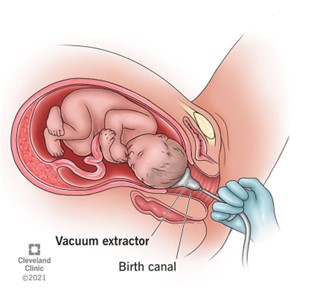A nurse is caring for a client who has experienced postpartum hemorrhage due to uterine atony.
Which of the following medications should the nurse anticipate administering?
Methylergonovine maleate (Methergine)
Magnesium sulfate (MgSO4)
Oxytocin (Pitocin)
Carboprost tromethamine (Hemabate)
The Correct Answer is C
Oxytocin is the most effective medication for preventing and treating postpartum hemorrhage caused by uterine atony, which is the failure of the uterus to contract after delivery. Oxytocin stimulates uterine contractions and reduces bleeding.
Choice A is wrong because methylergonovine maleate (Methergine) is a second-line uterotonic drug that can cause hypertension and should not be used in women with high blood pressure.
Choice B is wrong because magnesium sulfate (MgSO4) is used to prevent seizures in women with preeclampsia or eclampsia, not to treat postpartum hemorrhage.
Choice D is wrong because carboprost tromethamine (Hemabate) is another second-line uterotonic drug that can cause severe diarrhea and bronchospasm and should not be used in women with asthma.
Nursing Test Bank
Naxlex Comprehensive Predictor Exams
Related Questions
Correct Answer is C
Explanation
Oxytocin is the most effective medication for preventing and treating postpartum hemorrhage caused by uterine atony, which is the failure of the uterus to contract after delivery.Oxytocin stimulates uterine contractions and reduces bleeding.
Choice A is wrong because methylergonovine maleate (Methergine) is a second-line uterotonic drug that can cause hypertension and should not be used in women with high blood pressure.
Choice B is wrong because magnesium sulfate (MgSO4) is used to prevent seizures in women with preeclampsia or eclampsia, not to treat postpartum hemorrhage.
Choice D is wrong because carboprost tromethamine (Hemabate) is another second-line uterotonic drug that can cause severe diarrhea and bronchospasm and should not be used in women with asthma.
Correct Answer is A
Explanation
Perineal hematoma.A perineal hematoma is a collection of blood in the soft tissues of the perineum that can result from trauma during delivery, such as vacuum-assisted birth.The client may present with a large, tense, bluish bulge on the perineum and severe pain in the area.
Choice B. Vulvar varicosity is wrong because it is a condition where the veins in the vulva become enlarged and swollen due to increased blood flow and pressure during pregnancy.It usually appears as bluish or purple veins on the vulva and may cause discomfort, itching, or heaviness in the area.
It is not related to vacuum-assisted birth or prolonged labor.
Choice C. Rectocele is wrong because it is a condition where the rectum bulges into the vagina due to weakening of the pelvic floor muscles and connective tissue.
It may cause symptoms such as difficulty with bowel movements, a feeling of pressure or fullness in the vagina, or sexual dysfunction.
It is not related to vacuum-assisted birth or prolonged labor.
Choice D. Episiotomy is wrong because it is a surgical incision made in the perineum to enlarge the vaginal opening during delivery.
It may be done to facilitate delivery, prevent severe tearing, or protect the baby’s head from trauma.
It is not a diagnosis but a procedure that may be performed during vacuum-assisted birth or normal vaginal delivery.
Whether you are a student looking to ace your exams or a practicing nurse seeking to enhance your expertise , our nursing education contents will empower you with the confidence and competence to make a difference in the lives of patients and become a respected leader in the healthcare field.
Visit Naxlex, invest in your future and unlock endless possibilities with our unparalleled nursing education contents today
Report Wrong Answer on the Current Question
Do you disagree with the answer? If yes, what is your expected answer? Explain.
Kindly be descriptive with the issue you are facing.
